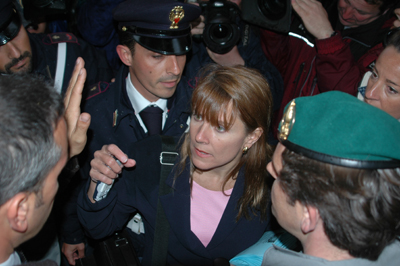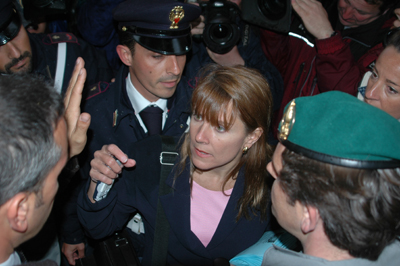
(RNS) Barbara Blaine, center, founder and president of the Survivors Network of those Abused by Priests (SNAP), found herself — literally — in the center of controversy at an impromptu 2005 press conference at the Vatican following the death of Pope John Paul II. The recent global sex abuse scandal has thrust Blaine and SNAP back into the spotlight. RNS file photo by Rene Shaw.

(RNS) Barbara Blaine, center, founder and president of the Survivors Network of those Abused by Priests (SNAP), found herself — literally — in the center of controversy at an impromptu 2005 press conference at the Vatican following the death of Pope John Paul II. The recent global sex abuse scandal has thrust Blaine and SNAP back into the spotlight. RNS file photo by Rene Shaw.
ST. LOUIS (RNS) The daily drumbeat of news about clergy sexual abuse began in Ireland last year. This year, the stories spread — to Germany, Italy, Switzerland, Norway. The drumbeat got louder.
E-mails from across the ocean continued to pour in to the Chicago and St. Louis offices of the Survivors Network of those Abused by Priests (SNAP). By last month, SNAP decided to respond.
Despite sharply declining revenue, the U.S.-based nonprofit group dug into its depleted coffers and found $6,000 for founder and president Barbara Blaine and outreach director Barbara Dorris to spend 10 days in Europe opening new SNAP chapters in Germany, Italy, Austria, the Netherlands, Belgium and England.
The pair slept on couches, rushed between buses and trains and grabbed snacks on the road. In Germany, they met with the justice minister and members of parliament about changing laws.
In its 22 years, SNAP has seen tremendous success in its mission to protect children. Many credit the group with bringing change to the Catholic Church since the clergy abuse crisis erupted in Boston in 2002.
But SNAP has also been criticized for the way it raises money, its aggressive pursuit of headlines, and the ways it publicly identifies priests accused of abuse by anonymous plaintiffs.
For the group’s leaders, the crisis in Europe feels familiar, in a sickening way. And in recent weeks, e-mails from Brazil, Colombia and Ecuador have begun to arrive.
“People all over the world are struggling to get their minds around this,” Dorris said. “They want to know how anyone would have known about a child molester — a church leader — and failed to take action. It feels a lot like the early days here.”
The early days started in 1985, when Blaine reported her own abuse to the church. Three years later, recognizing that victims of clergy sexual abuse and their families needed their own kind of support, she started SNAP.
The abuse scandal that erupted in the U.S. in 2002 thrust SNAP into the headlines. They facilitated relationships between victims, attorneys and the press, helping to animate a scandal that would eventually force the U.S. church to adopt reforms.
David Clohessy, SNAP’s national director, said the group’s founding mission remains the same today, “to expose predators and to protect children.”
In pursuit of those goals, SNAP’s leaders have been relentless critics of what it considers the Catholic Church’s policies of secrecy and self-preservation at any cost.
Since 2002, SNAP has maintained pressure on the church by alerting reporters to victims’ lawsuits, some with documentation that showed bishops moving problem priests from one diocese to another. The group has also fought statute of limitations laws that have been used to limit the size of financial settlements.
Even some U.S. church officials acknowledge that SNAP has made a difference.
Bishop Blase Cupich, head of the Diocese of Rapid City, S.D., and chairman of the U.S. bishops’ committee for the Protection of Children and Young People, said SNAP “has done some very important things.”
Despite its success, several factors — church reforms, a finite number of lawsuits, waning public interest in a difficult and graphic story — contributed to a slowdown in donations to the nonprofit group.
SNAP’s contributions grew nearly sixfold between 2002 and 2006, when its revenue was more than $900,000, according to IRS records. But the following year, SNAP brought in half that amount. In 2009, revenue fell again, to $420,000, with expenses of $499,000.
In the last year, the 9,000-member organization moved into smaller offices in Chicago and cut its treasurer from full time to 10 hours per week. Blaine works out of Chicago; Dorris and Clohessy live in St. Louis.
Clohessy’s own story of abuse made him a natural subject for news profiles during the height of the scandal. He was molested by a priest during a canoe trip when he was 12. His brother, the Rev. Kevin Clohessy, was accused of abuse in 1993 and removed from ministry in 2000. In 2002, David Clohessy sat on Oprah Winfrey’s couch, and People magazine put him on its list of “25 Most Intriguing People,” alongside Jennifer Aniston, Martha Stewart and Saddam Hussein.
SNAP’s critics often claim that its aggressive methods — leafleting the neighborhood around an accused priest’s church, or calling news conferences to herald the name of a newly accused priest — are irresponsible. Such tactics, they argue, permanently damage the reputation of a priest falsely or mistakenly accused by an alleged victim who can remain anonymous behind the shield of a John Doe lawsuit.
But Clohessy says SNAP does not name a priest unless a civil lawsuit has been filed, or the priest criminally charged or named in the press. He’s also unapologetic.
“You’ve got to err on the side of protecting the physical and emotional safety of children rather than the reputation of one adult,” Clohessy said.
Many church leaders and other critics also question where SNAP’s money comes from. Although nonprofit groups do not pay taxes, they must file annual IRS reports detailing the sources of their donations. Those details are not public, though some nonprofit groups make that information public in other ways, such as annual reports. SNAP doesn’t, leading to charges of hypocrisy.
“For an organization that demands transparency from the institutional church, why can’t SNAP be open and specific about its sources of funding and its expenses?” said Ned McGrath, a spokesman for the Archdiocese of Detroit.
(BEGIN FIRST OPTIONAL TRIM)
The theory among McGrath and other church officials is that victims come to SNAP for support and are directed to law firms that handle abuse claims. Those firms have pried more than $2 billion in settlements and judgments from the Catholic Church in the U.S. A portion of that money, some church leaders suggest, is given back to SNAP in contributions.
Blaine said the organization protects its contributors list to protect the privacy of victims, and declined to provide a list of attorneys or law firms that have contributed to SNAP.
“I don’t see us making some major change in exposing our donors,” she said.
(END FIRST OPTIONAL TRIM)
If SNAP’s success in the United States can be measured by the change it brought to a 2,000-year-old institution, then its accomplishments have been significant.
Few people close to the scandal deny SNAP’s impact. Some are more demonstrative.
“I kind of feel these people deserve the Nobel Prize,” said Terry McKiernan, founder and president of BishopAccountability.org, a database of priests accused of sexually abusing minors. “That’s the only thing that could express their achievement.”
(SECOND OPTIONAL TRIM FOLLOWS)
Although U.S. church officials probably would not go that far, some acknowledge SNAP’s impact, even as the organization prepares for its next battle with the Catholic Church.
“The archdiocese and bishops here believe that SNAP can be commended for helping to bring some of this to light,” said Monsignor John Shamleffer, judicial vicar for the St. Louis Archdiocese.
“We have taken and continued the work that SNAP began, and we’re doing that as a diocese. Both the archdiocese and SNAP want the same thing — the welfare and protection of children.”
(Tim Townsend writes for The St. Louis Post-Dispatch in St. Louis, Mo.)




